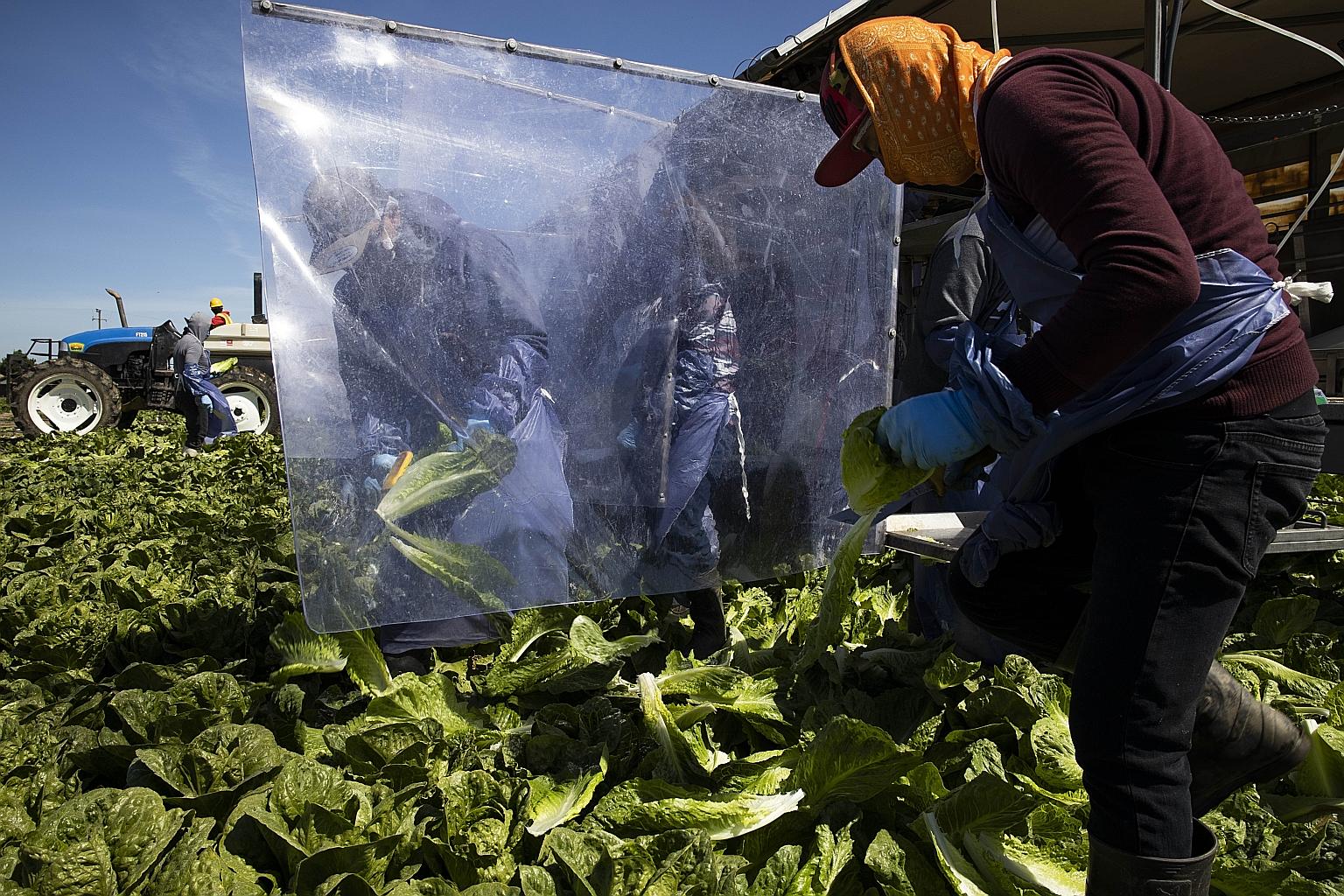Covid-19 offers preview of impact of environmental threats
Sign up now: Get ST's newsletters delivered to your inbox

Farm labourers harvest romaine lettuce on a machine with heavy plastic dividers that separate workers from one another in Greenfield, California, on April 27, 2020.
PHOTO: AFP
While some people may say that the Covid-19 pandemic is pushing climate change off the front page, we see more similarities than dissimilarities.
Both transcend ideology in testing the basic competence of individual governments in dealing with complex, longer-term risks. Judgments will be made, and some governments may fall short as a result.
Both involve the short-term investment, longer-term problem of paying a small sum now to prevent harm, versus larger remediation costs in the future.
With Covid-19, early investments in pandemic control and prevention mirror the difference between mitigation versus adaptation strategies in climate change.
Both present economies with different choices because limited resources force difficult calculations.
For example, a higher-income but demographically older Japan, with a median age of about 47, faces a disproportionate fatality risk from Covid-19 compared with middle-income Indonesia, which has a median age of about 30.
But the Indonesian government may see a disproportionately greater risk of unhappy youth facing poorer longer-term economic prospects if anti-Covid-19 measures continue indefinitely.
The economic impacts of both the pandemic and climate change will be very large, regardless of public health or environmental considerations. Notwithstanding trade tensions between the United States and China, the world has awakened from a period of relatively calm international economic and financial developments into a more chaotic situation, which pressures them to make difficult decisions targeted at saving lives immediately.
Some were prepared for this, and were quick to address the emergency, as they had learnt from past experiences such as Sars and Mers. These countries and territories - such as South Korea, Singapore, Hong Kong and Germany - are still battling Covid-19, but in a much calmer situation compared with others. Developing countries, including Indonesia, were faced with harder problems in terms of choosing to boost the economic sector or conceding to the pandemic.
But the impact of Covid-19 is likely to be just a fraction - no more than one to one hundredth of a percentile - of the anticipated devastation from climate change.
The Intergovernmental Panel on Climate Change has warned that the world is likely to warm by 1.5 deg C between 2030 and 2052, if global emissions continue to increase at the current rate.
This will induce impacts such as sea level rise, and endanger biodiversity and ecosystems.
For humans, this would mean increased climate-related risks to health, livelihoods, food security, water supply, human security and economic growth.
RAPID CHANGE
The narratives of climate change and the pandemic are similar in that they are both linked to rapid change.
People protesting against what would otherwise be fairly straightforward public health measures (closure of mosques, churches and non-essential stores to reduce the spread of the virus) because they violate "freedom" seems a pretext.
Most people are afraid of the rapid change in their daily lives and are scared of what is coming in the near future.
In the US, various Republican governors, mostly in the south-east, are reopening businesses and de-emphasising the need for social distancing, often against criticism from the medical and expert communities.
Democratic governors, however, tend to do otherwise.
There will probably be some very unhappy people if the virus comes roaring back in some Republican-governed states. And as Republican voters tend to be older, there could be a fair number of deaths among people who voted for those governors.
Climate change impacts would also occur as rapidly. Natural disasters can lead to displacements, a massive number of deaths or the loss of an entire state due to sea level rise.
The pandemic and climate change also highlight the issue of stranded assets.
The fossil fuel industry would face insurmountable problems if more nations, aware of the need to avoid the harshest impacts of climate change, shift from fossil fuels and move towards renewables.
During the current Covid-19 pandemic, oil prices plummeted all over the world. Oil-producing countries are losing billions of dollars from the economic interruption.
But despite the similarities, climate change and the Covid-19 pandemic have been framed differently by the media.
Climate change impacts are often portrayed as something which will happen in the future, or near future, while the threat posed by Covid-19 is portrayed as urgent and deadly.
For climate change impacts, people have ignored changes in basic factual frameworks for much too long, simply because the change represented is simply too much, and the economic dislocations too much as well if they accepted them as framework.
During this pandemic, however, there are billions of dollars at stake.
But we need to understand that this pandemic is just a preview for the impacts of climate change.
The significant death rate of Covid-19 would be nothing compared with the possibility of injuries, illnesses and deaths from extreme weather and climate events, malnutrition, heat stress and malaria as climate change impacts.
- Linda Yanti Sulistiawati is a senior research fellow at the Asia-Pacific Centre for Environmental Law at the National University of Singapore. She is also an associate professor of law at the Universitas Gadjah Mada in Indonesia. David K. Linnan is an associate professor of law at the University of South Carolina in the United States and lecturer of IUP law at the Universitas Gadjah Mada in Indonesia.


